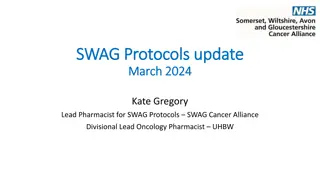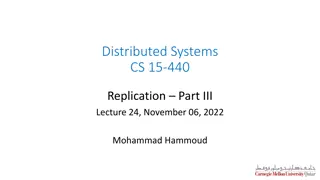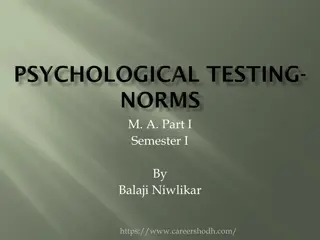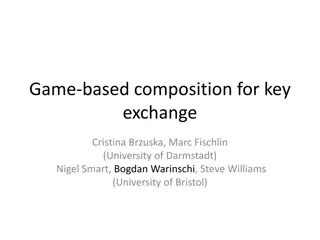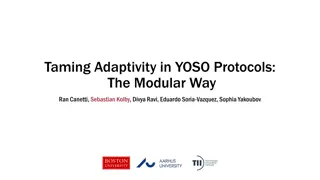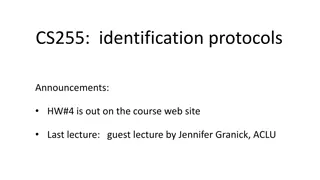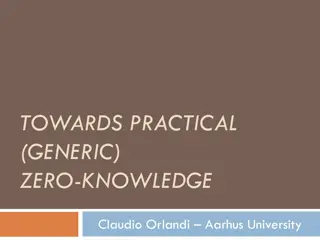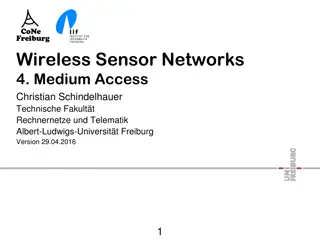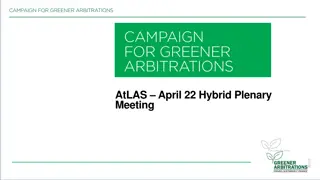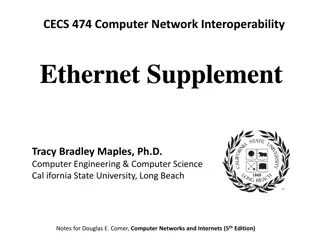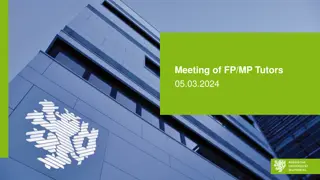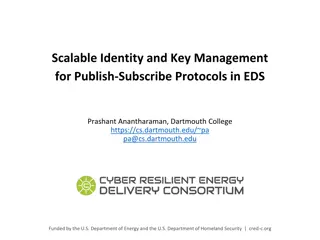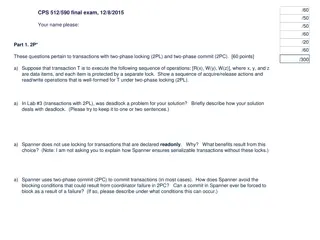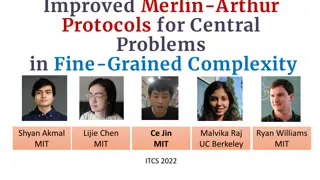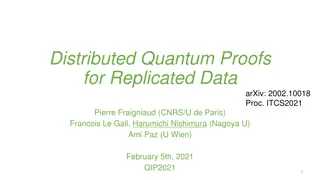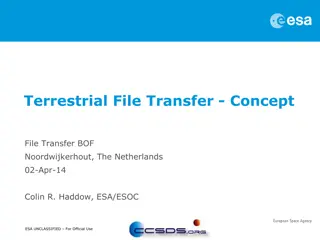Actions Emanating from the Evaluation of the Governance Reform
The evaluation of the governance reform within the WMO aimed to assess its alignment with strategic objectives, effectiveness in responding to societal needs, coordination efficiency, decision-making process, agility, and more. Evaluation criteria included relevance, design validity, effectiveness,
1 views • 13 slides
Update on SWAG Protocols and New NICE TA Progress Report
Kate Gregory leads the SWAG Protocols update for March 2024, with advancements in new protocols and NICE TA updates. A comparison of activities from Oct 2023 to Mar 2024 shows progress in issuing, reviewing, and drafting protocols. The latest NICE TA additions include treatments for advanced cancers
5 views • 13 slides
Comprehensive School Quality Assurance and Evaluation Process
A detailed insight into the Quality Assurance Department's role in school evaluation and improvement processes, including Whole School Evaluation (WSE), Follow-through initiatives, Teaching and Learning assessments, Resumption and Examination Monitoring. The process involves both internal self-evalu
0 views • 20 slides
Methods of Training Evaluation: Overview and Importance
Training and development are fast-growing fields globally, including in India. Evaluation plays a crucial role in understanding the effectiveness and efficiency of training programs for human resource development. This presentation covers the concept of training, evaluation strategies, methods/model
0 views • 61 slides
Universal Evaluation Framework: Simplifying Evaluation Processes
This session introduces the Universal Evaluation Framework (UEF) developed for evaluating QAA Scotland Enhancement Themes. Participants learn key evaluation questions, evidence capture, and the Theory of Change to enhance evaluation confidence. The QAA Scotland Evaluation Odyssey details historical
2 views • 14 slides
Implementing Blind Evaluation Pilot in HORIZON EUROPE: Key Facts and Process
HORIZON EUROPE is conducting a pilot on Blind Evaluation in the 2023-2024 work program to address biases in the research and innovation evaluation process. The pilot aims to assess the feasibility of blind evaluations in ensuring fairness and mitigating potential biases towards well-known organizati
9 views • 9 slides
Understanding Consistency Protocols in Distributed Systems
Today's lecture covers consistency protocols in distributed systems, focusing on primary-based protocols and replicated-write protocols. These protocols play a crucial role in ensuring consistency across multiple replicas. One example discussed is the Remote-Write Protocol, which enforces strict con
0 views • 35 slides
Strengthening National Evaluation Capacity in the Era of Sustainable Development Goals
The presentation by Vijayalakshmi Vadivelu at the National Evaluation Capacities Conference 2017 in Istanbul focused on the importance of strengthening national evaluation capacity in alignment with the Sustainable Development Goals (SDGs). The content covers the holistic approach to national evalua
3 views • 18 slides
Exploring Developmental Evaluation for Better Decision-Making
Delve into the realm of developmental evaluation, focusing on its purpose, principles, and application in practice. Understand how developmental evaluation emphasizes real-time data collection for informed decision-making in complex systems. Learn about key principles such as developmental purpose,
0 views • 25 slides
Evaluation Practices in Macedonia: What Works, What Doesn't
The comparison between the effectiveness of evaluation practices and the presence of formal institutions in Macedonia raises questions about the impact of institutional design on outcomes. While some countries with robust evaluation institutions fall short in practice, others lacking such structures
1 views • 7 slides
Enhancing Evaluation Capabilities in Mongolia for Agenda 2030
The Mongolian Evaluation Network in collaboration with UNDP is working to integrate the 2030 Agenda into national strategies and plans, establish institutional coordination mechanisms, align budgets, and enhance data monitoring systems. Key stakeholders including government agencies, NGOs, and inter
0 views • 9 slides
Understanding Demi-Regularity in Realist Evaluation
Realist Evaluation is a theory-driven approach focusing on understanding the context and mechanisms of action behind policies and interventions. This webinar explores the concept of demi-regularity in realist evaluation, its origins, and its application in analyzing complex evidence. Key aspects cov
1 views • 16 slides
Understanding Evaluation in Education
Evaluation in education is a comprehensive term that encompasses measurement, testing, and qualitative examination of student behavior. It involves both quantitative and qualitative descriptions, along with value judgments. Differentiating from mere measurement, evaluation provides a deeper analysis
0 views • 28 slides
Understanding Measures of Central Tendencies and Norms in Test Evaluation
Exploring topics such as measures of central tendencies (mean, median, mode), variability, understanding raw scores, standardization samples, norms in test evaluation, and types of evaluation protocols. Learn about developing norms, derived score interpretation, and the significance of evaluation me
7 views • 35 slides
Sustainable Evaluation Systems Workshop Summary
Workshop on Sustainable Evaluation Systems by Stephen Porter at the NEC Conference focused on defining evaluation systems, addressing their failures, and emphasizing the importance of quality, use, and networks in achieving sustainability. Participants engaged in activities such as bingo card introd
0 views • 38 slides
Strategic Management: Strategy Review and Evaluation
This chapter delves into the critical process of strategy review, evaluation, and control in strategic management. It covers the nature of strategy evaluation, effective evaluation systems, contingency planning, auditing, using computers for evaluation, and guidelines for effective strategic managem
1 views • 42 slides
Secure Composition of Key Exchange Protocols
Explore the game-based composition approach for key exchange protocols, focusing on ensuring security in compositions with arbitrary tasks and the universal composability of protocols. Delve into the Bellare-Rogaway security model and the details of security games in protocol analysis. Understand ke
0 views • 25 slides
Taming Adaptivity in YOSO Protocols: The Modular Way
Explore the concept of taming adaptivity in YOSO protocols through a modular approach. The research delves into the efficiency, adversary adaptivity, role assignments, and compiler models in synchronous YOSO protocols. The visual presentations illustrate the framework, challenges, and strategies in
0 views • 19 slides
Understanding Evaluation and Ideology in Translation
Evaluation plays a crucial role in the study of translation, influencing both meaning and value in communication. This evaluation is reflected through language elements like accentuation, deletion, and substitution. Appraisal, stance, and evaluation are key terms in linguistic analysis that focus on
2 views • 22 slides
Impact and Evaluation Toolkit for Churches and Christian Charities
This toolkit aims to equip churches and Christian charities engaged in small-scale social action projects to think about impact, measure impact, choose data tools, reflect on evaluation data, and use it effectively. It covers principles of evaluation, setting objectives, selecting indicators, storyt
0 views • 34 slides
Evaluation Metrics for IEEE 802.11-14/0107 HEW Proposal
Evaluation metrics play a crucial role in assessing WLAN system performance and achieving the objectives of High Efficiency WLAN (HEW). This proposal by Yonggang Fang et al. from ZTE outlines the key evaluation metrics recommended for evaluating HEW performance, including area throughput, average th
0 views • 12 slides
Overview of Monitoring and Evaluation in the GEF
The Evaluation in the GEF and Training Module focuses on promoting accountability and learning within the Global Environment Facility (GEF) through monitoring and evaluation activities. The GEF Independent Evaluation Office plays a crucial role in assessing results, effectiveness, and performance of
0 views • 25 slides
Chile Country Portfolio Evaluation 2010-2014 Summary
Evaluation process of Chile's country portfolio from 2010-2014 included pre-evaluation, during evaluation, and results/conclusions phases. Challenges like defining scope and participant concerns were addressed. Preliminary conclusions were presented to stakeholders, leading to a trustful and represe
1 views • 6 slides
Potential Amendments for Reforming REACH Evaluation Process
Discussion at the Ad-hoc Meeting of Competent Authorities for REACH and CLP focused on potential options for amending the REACH Regulation to reform the evaluation process. Topics included registration-related measures, substance evaluation, testing proposals, compliance checks, and expectations dur
0 views • 30 slides
Developing an Evaluation Work Plan for Effective Program Assessment
This presentation by Amy D. Andrade from San Jose State University focuses on developing an Evaluation Work Plan to identify responsibilities and timelines. It covers topics such as Evaluation Coaching Support, Webinar Outlines, Logic Model, Inputs-Outputs-Outcomes, Two Approaches to Evaluation, Pro
0 views • 29 slides
Overview of Identification Protocols in CS255 by Dan Boneh
The lecture in CS255 covers various topics related to identification protocols, including signatures from trapdoor functions, certificates, revocation methods, certificate issuance problems, defense mechanisms like certificate transparency (CT), and moving on to protocols. The talk also explores the
0 views • 43 slides
Towards Practical Generic Zero-Knowledge Protocols
Exploring the evolution of zero-knowledge protocols, this presentation by Claudio Orlandi from Aarhus University delves into the concepts of Zero-Knowledge from Garbled Circuits, Privacy-Free Garbled Circuits, and more. The talk discusses efficient methods for proving statements and touches on relat
0 views • 29 slides
Evaluation Synthesis in Changing Contexts: Enhancing Knowledge for Development Effectiveness
Evaluation synthesis is crucial for promoting learning, reflection, and decision-making in development work. This process involves bringing together diverse knowledge sources to generate strategic insights and facilitate wider use of evaluation findings. The Independent Office of Evaluation of IFAD
0 views • 20 slides
Evaluation of FME Zero Emission Neighbourhoods in Smart Cities
The mid-term evaluation process of FME Zero Emission Neighbourhoods in Smart Cities involves self-evaluation, partner evaluation, and panel evaluation. The procedure includes scientific review, evaluation by scholars, and innovation assessment. Key documents like self-reports, progress reports, and
1 views • 20 slides
Wireless Sensor Networks: Medium Access Protocols Overview
This collection of images presents key concepts in wireless sensor networks, focusing on medium access protocols, the ISO/OSI reference model, types of conflict resolution, contention-free protocols, Bitmap protocol, ALOHA algorithm, and its analysis and efficiency. Various protocols and algorithms
0 views • 83 slides
Overview of Regular Evaluation 2017 Findings in Estonia
In the Regular Evaluation 2017, efforts were made to maximize the benefits of evaluation outcomes for various stakeholders in Estonia such as the state, society, and institutions. The evaluation focused on a range of actions including preparing legislation, finding experts, creating self-report form
0 views • 6 slides
Green Protocols for Greener Arbitrations
The Green Protocols introduced by AtLAS aim to guide the arbitration community in committing to environmentally sustainable practices. These protocols suggest ways to reduce carbon emissions, energy consumption, waste generation, and unnecessary travel by utilizing electronic communication, video co
0 views • 14 slides
Understanding Ethernet and Multiple Access Protocols in Computer Networks
Exploring the fundamentals of Ethernet and multiple access protocols in computer networks, this content discusses the two primary categories of multiple access protocols - contention access and controlled access. It delves into topics such as CSMA/CD, LANs, performance of multiple access schemes, ad
0 views • 7 slides
Comprehensive Guide to Training Evaluation Methods
This detailed guide covers the aim of evaluation, evaluation methods, techniques of evaluation, types of evaluation (formative, process, outcome, impact), and the significance of formative and process evaluation in assessing training effectiveness. Learn about the key principles and practices involv
0 views • 45 slides
FP/MP Tutors Meeting: Feedback, Protocols, and Experiments Evaluation
Feedback from students highlighted challenges in reaching tutors and experiment discrepancies. Requests include prompt protocol corrections and clear grading guidance. Experiment list with corresponding tutors provided. Protocols are evaluated based on various criteria. Points distribution and impor
0 views • 8 slides
Scalable Identity and Key Management for Publish-Subscribe Protocols
This research by Prashant Anantharaman from Dartmouth College focuses on scalable identity and key management for publish-subscribe protocols in Energy Delivery Systems. It discusses the architecture, goals, assumptions, and implementation results in the context of PKI vs. Macaroons protocols. The w
0 views • 37 slides
Comprehensive Examination Questions on Data Management Systems and Security Protocols
This content covers a range of topics related to data management systems, including two-phase locking and two-phase commit protocols, Bayou system with vector clocks and causality, digital signatures and certificates in protocols, and authentication protocols. Questions include scenarios and concept
0 views • 6 slides
Improved Merlin-Arthur Protocols for Fine-Grained Complexity Problems
The text discusses Merlin-Arthur proof systems and protocols for central problems in fine-grained complexity, particularly focusing on the time complexity, completeness, and soundness of these protocols. It also touches on recent interest in these protocols and presents new results in areas such as
0 views • 16 slides
Quantum Distributed Proofs for Replicated Data
This research explores Quantum Distributed Computing protocols for tasks like leader election, Byzantine agreement, and more. It introduces Quantum dMA protocols for verifying equality of replicated data on a network without shared randomness. The study discusses the need for efficient protocols wit
0 views • 28 slides
Terrestrial File Transfer Concept: Design Goals and Protocols
This document discusses the concept of terrestrial file transfer as presented in a series of slides from an ESA event in Noordwijkerhout, The Netherlands. It covers the purpose, design goals, protocols, and transport protocols involved in exchanging files between agencies for mission design, operati
0 views • 20 slides

